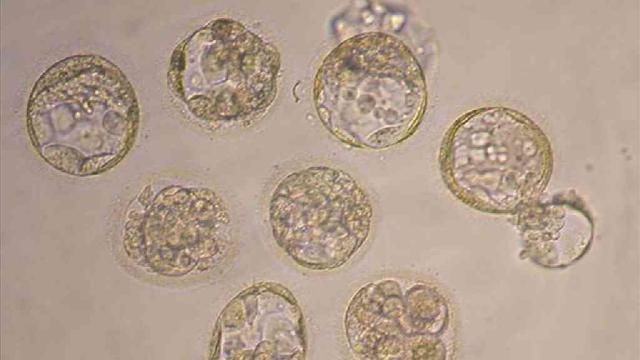A decades-old rule, in which research scientists are forbidden to experiment on human embryos beyond the 14-day mark, is being challenged by a British bioethicist, who says the rule is outdated, arbitrary, and an unnecessary impediment to scientific progress.
By extending the 14-day limit to 28 days, scientists will be better able to prevent miscarriages, develop new medical treatments, and improve assisted reproductive technologies, argues Sophia McCully, a bioethicist from the Department of Global Health and Social Medicine at King’s College London, in a peer-reviewed opinion piece published today in the Journal of Medical Ethics.
The 14-day rule has been around for about 40 years. In the United States, this rule has been enforced by the National Institutes of Health since 1979. In the United Kingdom, the rule is upheld by the Human Fertilisation and Embryology Authority. The 14-day rule is honoured in many other countries and jurisdictions, including Australia and Canada, both formally and informally.
This line-in-the-sand was chosen because it’s only after this stage that the central nervous system starts to develop, but, as McCully writes, “opponents of the rule argue that this was simply an arbitrary time limit that was chosen as a compromise to permit any research at a time when prolife views were strong.” What’s more, “we can now be confident it is safe to make a policy change and extend the 14-day rule without fear of any moral and regulatory slippery slope, a concern which need not apply to the 14-day rule,” she writes.
McCully contends that research done between the 15- to 28-day window is critical, saying massive developmental changes are experienced by the embryo during this time.
Research on human embryos during this timeframe could lead to many new scientific insights and interventions, she says, including the mitigation of birth defects (such as heart disease), advances in in vitro fertilisation, the prevention of miscarriages, and the testing of new techniques, including mitochondrial replacement therapy (colloquially known as “three-parent babies”) and human trait selection (the latter to eliminate genetic diseases or confer new capacities, such as immunities to communicable diseases).
She says the argument that animal models, including monkey embryos, are sufficient substitutes for human embryos is not entirely accurate. Recent evidence suggests “that even the morphology of the mammalian blastocyst differs substantially among species,” McCully writes, and as such, “while animal models are useful to an extent, after all some mechanisms are similar, this diversity shows there is really no substitute for a human embryo to understand human embryogenesis.”
The 14-day limitation also seems arbitrary considering prevailing abortion laws, in which pregnancies can be terminated well beyond 14 days, she writes.
“From this analysis, and that of others, there are no substantive ethical reasons for not altering the limit,” argues McCully. “Embryo research is a crucial undertaking and will help us to make many transformational discoveries, thus extending this very arbitrary limit is an endeavour that must be achieved.”
James Hughes, a bioethicist with the Institute for Ethics and Emerging Technologies, said two weeks is not a significant delineator for determining the moral significance of an embryo and foetus. During the 18th century, the “line was ‘quickening,’ when a foetus began to move,” explained Hughes in an email, while more recently, with the Roe v Wade decision in the U.S., this precedent “invented moral lines at the first, second, and third trimester.”
Hughes agreed that scientists shouldn’t have to treat embryonic tissues as being exactly the same as other tissues, “but if its moral significance is determined by its ability to experience pain or self-awareness, then one-month-old embryos might as well be a tumour or kidney,” said Hughes. Ultimately, McCully’s piece presents a “very cautious proposal to advance research that will benefit all children, with no moral hazard,” Hughes said, adding that it’s a “necessary reform.”
Bioethicist Kerry Bowman from the University of Toronto said the 14-day rule was established not just because of the “primitive streak” — an objective, visible streak of cells (indicative of a nascent central nervous system) — but also because individuation is believed to commence, meaning that, after this time, the “embryo is no longer capable of forming twins or higher-order multiples spontaneously,” which secure “the beginnings of an individual,” he wrote in an email.
“Yet I would argue the real reason for the 14-day limit is to show a spirit of respect in complex pluralistic societies with a wide range of views on the moral status of the embryo,” explained Bowman. “The 14-day rule did not satisfy everyone, but it does acknowledge and respect many people who hold ‘gradualist’ views of the moral status of the embryo.”
A major challenge with the proposed change, he said, is that by breaking a highly symbolic, public, and (often) international standard, scientists might lose trust from certain segments of the population and even other nations.
“I believe this change needs broad public exposure and debate, as pushing this through without public review could create significant hostility to the field of embryology,” said Bowman.
In recent years, other experts have made a similar case to the one being made in the Journal of Medical Ethics (see here, here, and here), yet nothing seems to change in this regard. Perhaps McCully’s paper will restart this much-needed conversation.
